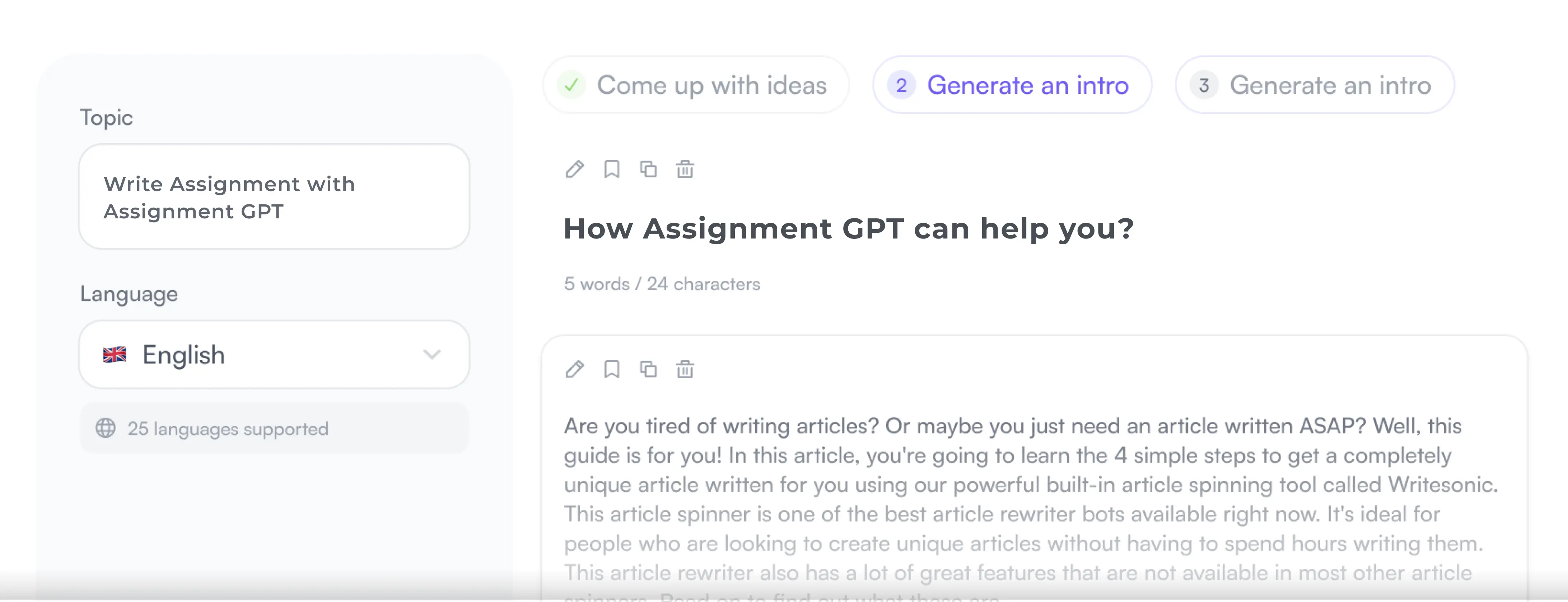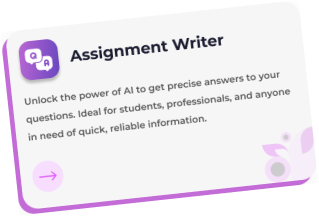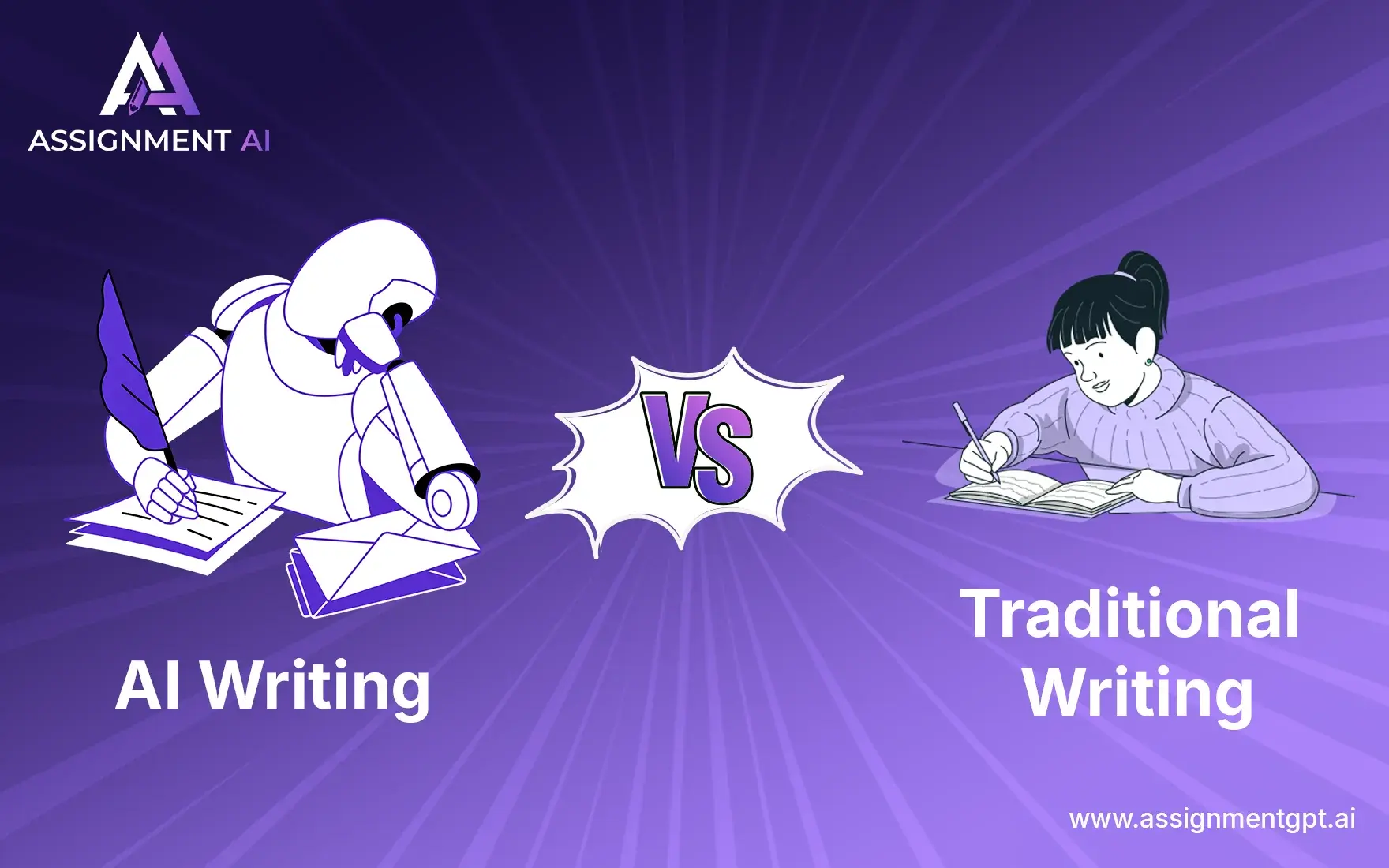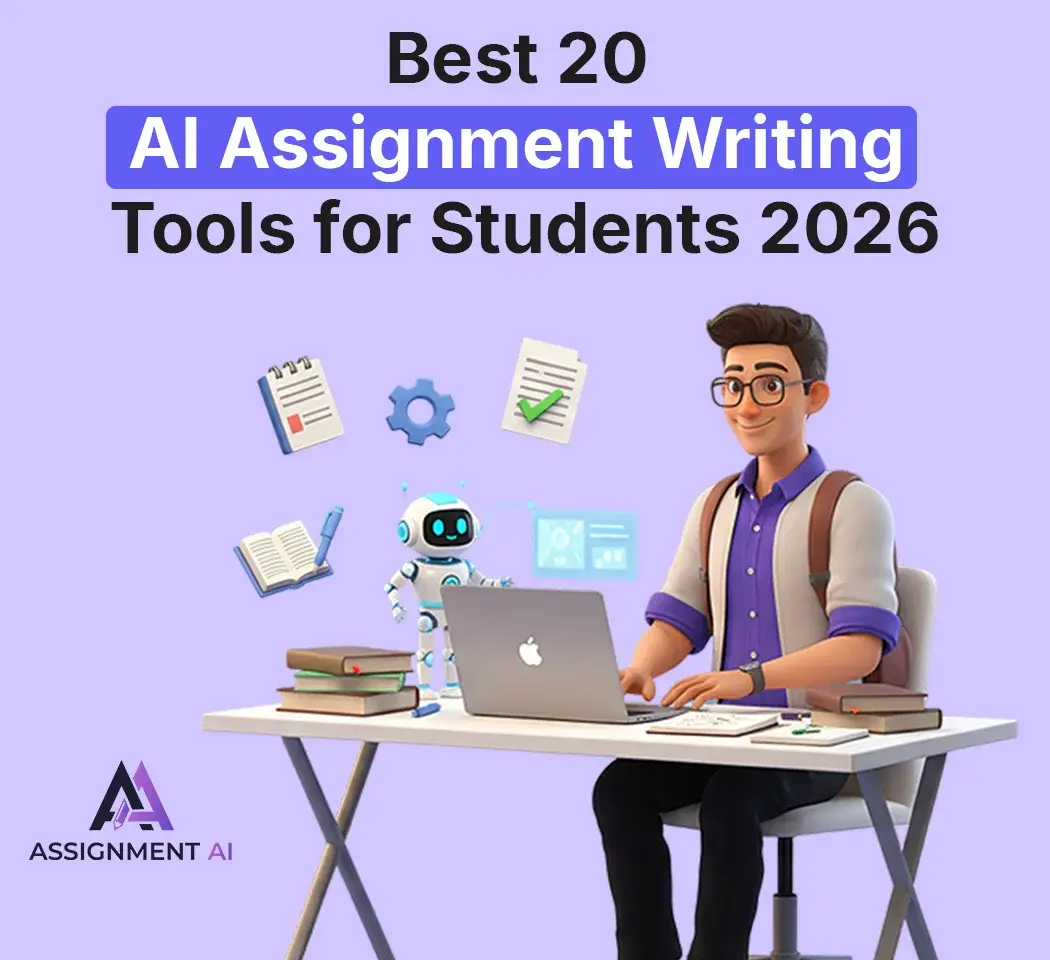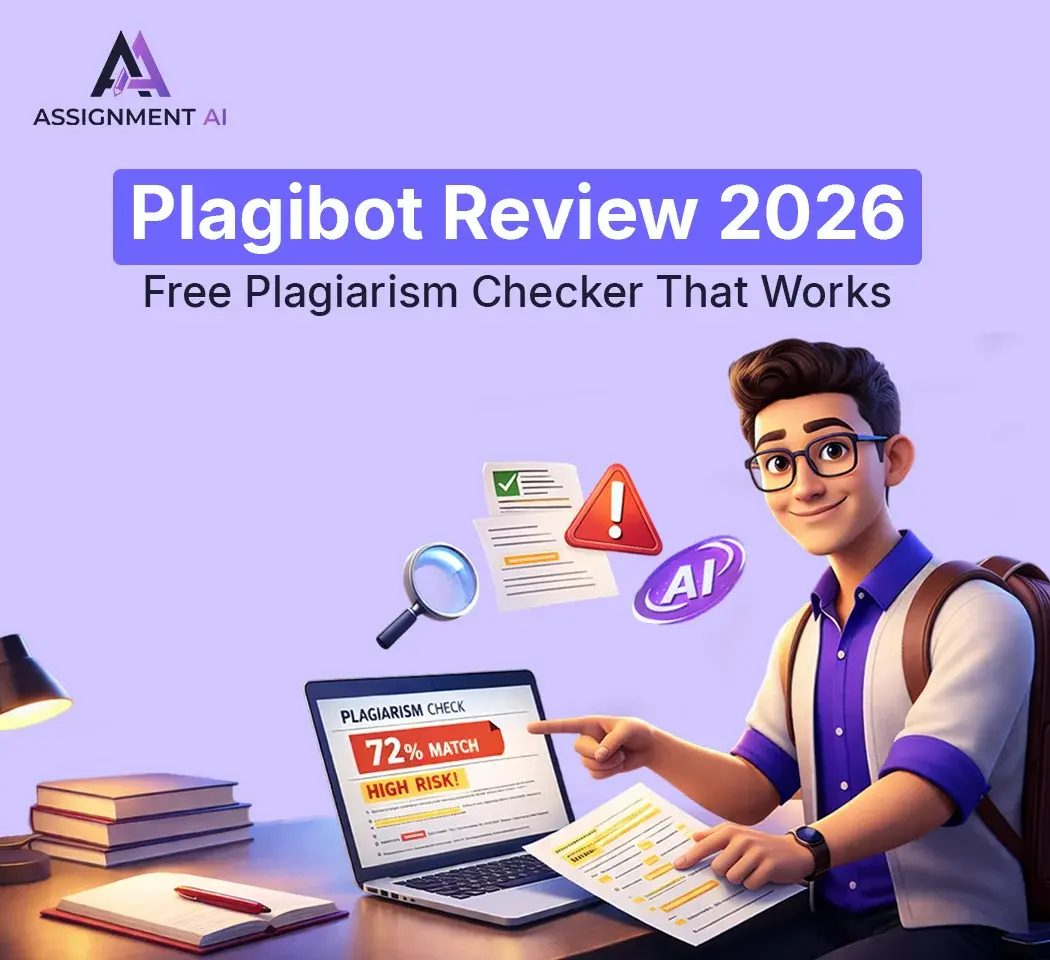AssignmentGPT Blogs
As advanced AI writing assistants enter the market, writing blogs, essays, or assignments has become much easier. AI tools instantly generate content, saving humans considerable time and effort, and creating what you might call a modern type of writing.
Now let's understand from another scenario, like a human writer, for writing he needs a proper outlining, sources, citations and after that he will write any average blog randomly and in this he will add his emotions, and real-world examples, and it may take him weeks to complete, and this you can call traditional writing.
Both these methods have their core strengths, and it largely depends on the content requirement as to which writing method you should choose, as both the writing strategies have their own advantages and limitations, and we will try to clear this up in today's article, in which we will learn about the different perspectives of AI Writing and Traditional Writing.
Quick Summary
As we all know, the world of 2025 has become much faster. People are shifting from e-commerce to quick commerce. We're seeing the effects of these changes in the writing industry as well, with writers using AI tools to maintain their speed and scalability. While there's no problem with using AI tools, it's only if they are used ethically. Using AI tools without a strategy and without any planning can result in content being penalized by search engines, and this fear leads many content writers to opt for the traditional way of writing, avoiding the use of any AI tools.
You can follow some basic rules to maintain the best writing strategy, whether you choose AI writing or traditional writing, which will increase your productivity and be ethical.
Our focus in this article:
- What is AI writing and traditional writing?
- What are the pros and cons of AI writing and traditional writing?
- What are the myths of AI writing and traditional writing?
- Which is the best way of writing, AI writing or traditional writing?
What is AI Writing?
In simple terms, AI writing refers to content generated by AI or machine intelligence using existing data.
1. How AI Writing Works
There are many AI chatbots or LLMs available in the market, such as ChatGPT and Gemini. When you input content or provide a prompt, these models analyse your request using their massive data sets and information. They then check the request against existing online data or training databases and generate blogs and articles based on the request. This process usually takes seconds, but can take longer if you enable research or deep thinking modes.
2. The Role of Prompts and Data
AI cannot think because it lacks the experience or emotions of humans, so it can only predict. It uses patterns to generate new sentences. Because of this, the context of the output often doesn't match the request, so if your prompt is clear and generic, you'll get relevant answers. However, if the request isn't basic or in-depth, your result is likely to be robotic or unstructured. Therefore, using AI tools requires basic prompting knowledge.
What is Traditional (Human) Writing?
Since the advent of the internet, traditional writing has been the norm in the writing sector. Traditional writing means that an experienced human is writing content on a topic.
1. Emotion, Experience & Authenticity
As we know, AI doesn't have emotions, so Google doesn't support low-quality content that doesn't follow its EEAT guidelines. This problem is largely solved with traditional writing, as professional writers and journalists have a thorough knowledge of their field and use their knowledge and experience to write useful content.
Traditional human writing is still preferred in most industries, and the article you're reading was written using traditional writing, which may give you the sense that traditional writing is more personalised.
2. The Creative Process
All writers have different writing and creative processes. Let me explain my writing process. Humans can understand any topic, tone, or humour, and can write flexibly based on it because there are many topics where it's often not easy for a person to understand the context after reading the topic.
Humans have a high understanding and emotion,s and when an experienced writer uses these qualities while writing, it is in a way that traditional writing is eaten up.
How AI Writing Is Being Used Today in Content & SEO
Personally, as I've noticed, AI writing is being used in almost all types of content and sectors. Because its cost is almost zero and its creation speed is quite high, let's explore where AI writing is being used most today.
1. Marketing and Content Creation
As we all know, AI is being used for everything from YouTube scripting to article writing. Many marketers use AI tools to select keywords and generate new content. They are also able to generate content for people in different regions.
2. Automation in SEO Workflows
I've seen many SEO professionals use AI for keyword research or generating FAQ-rich snippets. In fact, professionals use AI not only for faster writing but also to make their content smarter. And thanks to these AI tools, 71.7% of new content published online involves AI. Professionals for whom content doesn't play as important a role use AI tools to automate repetitive writing.
Advantages of AI Writing
If you use platforms like AssignmentGPT AI for copywriting, it's important to understand their advantages.
1. Speed & Efficiency
Most AI tools can generate a full-length, 1,000-word article within 10 minutes. Humans, on the other hand, will spend hours just doing basic outlining and research, followed by drafting and editing. These processes significantly reduce productivity. This is why many agencies use AI tools for high productivity.
2. Cost-Effectiveness
Hiring skilled writers costs approximately $25 to $150+ per hour in the USA, which is too expensive for many startups. Therefore, companies that cannot afford professional writers use AI tools to cut costs in content operations.
Drawbacks / Risks of AI Writing
We learned at the beginning of the article that Google dislikes low-quality AI writing, and there are several major reasons behind this. Let's understand the risks of using AI writing tools.
1. Lack of Creativity & Emotional Depth
AI tools can't feel; they can only predict. However, many AI tools and content humanizers attempt to recreate tone and emotions, but they don't have a human feel. Because only humans can express a situation with appropriate emotions, not AI.
2. Plagiarism & Accuracy Concerns
AI collects existing sources and information to write new content, which increases the risk of plagiarism. AI content is often of low quality, which is why Google penalizes such content and flags it as 'misleading content.'
Therefore, professional writers always write content in accordance with Google's "Helpful Content" update to avoid facing plagiarism issues.
Comparing Key Dimensions
Let's try to understand AI writing and traditional writing on different parameters. This will give you better insights and strengths, and then you can choose between traditional and AI writing based on your content requirements.
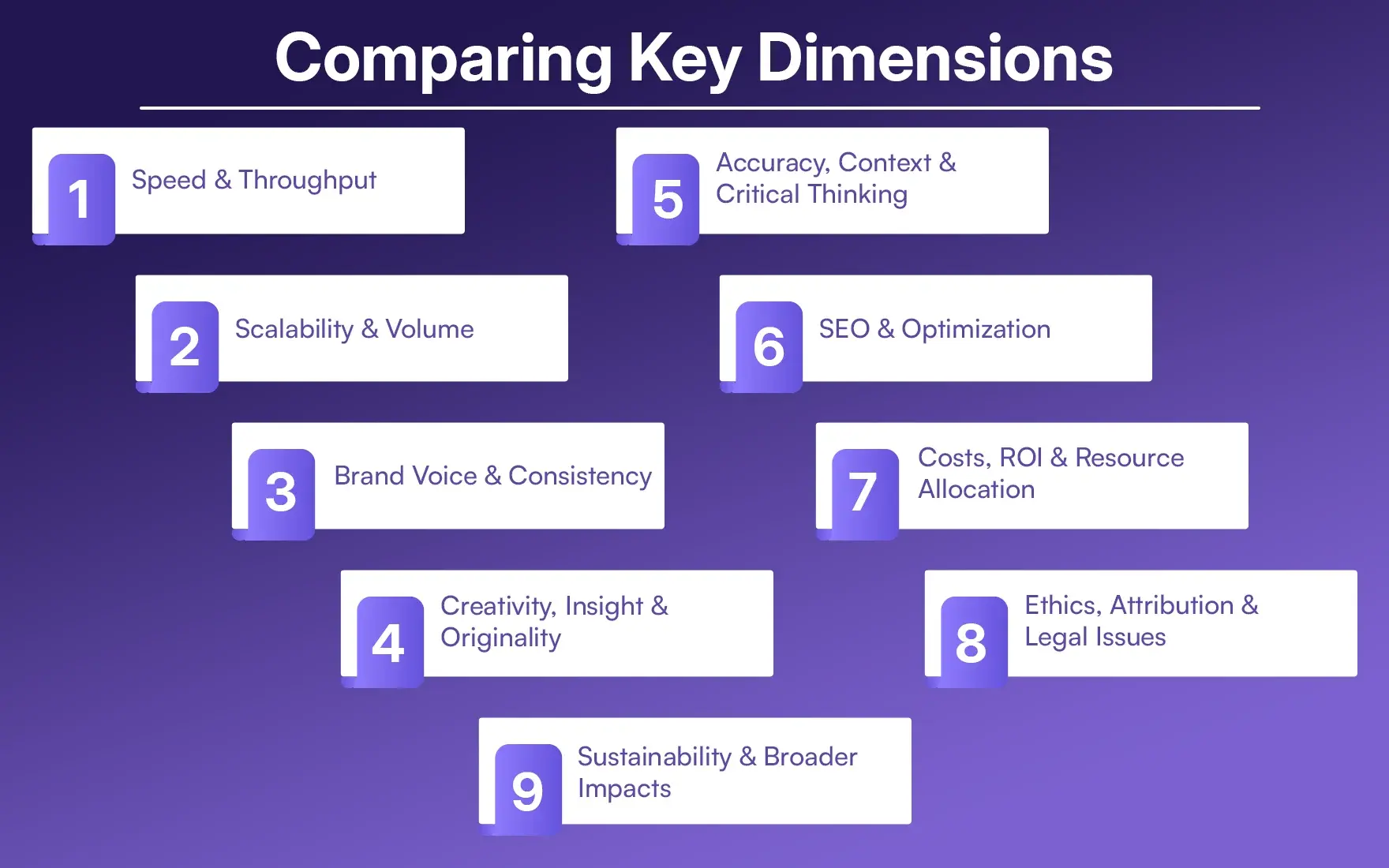
1. Speed & Throughput
In terms of speed, AI tools can create and optimise content up to 5 times faster than humans, but even this speed is useless for professional content, as AI content requires in-depth editing and fact-checking, and manual checking can be quite time-consuming if the accuracy and readability of the content are to be maintained.
Pro Tip: If you use AI, use it for drafting, and you can use your knowledge and skills to enhance the quality of the content.
2. Scalability & Volume
Mostly, e-commerce platforms that require bulk product descriptions and blogs use it heavily. And many agencies generate large-scale FAQ-based articles or landing pages using AI tools. But as we know, the quality of such content is quite poor.
And if you publish too much AI content, it could cause Google to label your website as spam or de-index it. Therefore, I advise you not to use AI tools to generate content in bulk.
Best Practice: Use AI tools for ideation and formatting, and only publish content written by humans, for long-term growth.
3. Brand Voice & Consistency
AI tools try hard to mimic the tone and emotions of humans, but they cannot create a human personality. And as we know, brand voice is unique, with authoritative or conversational elements, emotions that AI can never fulfil.
Solution: If you're generating content for brand voice, use AI tools for unique branding ideas and formatting, not generating content directly from AI tools.
4. Creativity, Insight & Originality
If you've watched podcasts, you'll have noticed that, no matter how professional, humans often have a very casual and relaxed tone, incorporating humour and lived experiences. However, AI tools simply rephrase existing content, which is why professional publishing companies prefer human writers for creativity and originality.
Solution: If your main focus is creativity and originality, you can choose the AssignmentGptAi platform. You can use this platform's tools to format or generate ideas.
5. Accuracy, Context & Critical Thinking
I've often noticed that AI tools can be quite hallucinatory for readers, as they often misunderstand the context of sentences, leading to factual errors in 30% of AI responses. And that's why brands don't prefer such content, as it erodes trust with customers. However, human writers, on the other hand, fact-check and contextualise, making human content more balanced.
6. SEO & Optimization
Many platforms, like Semrush, use AI to guide keyword insertion and structure creation. It identifies thousands of pages to find the most relevant answers and topics, and then generates answers accordingly.
Google has already disclosed in its updates that it values E-E-A-T for ranking. As we know, AI tools can never generate experience-based articles, so you should write high-quality articles yourself and use citations to enhance their quality for long-term ranking.
7. Costs, ROI & Resource Allocation
Small businesses and startups use AI content to reduce content generation costs by up to 80%-90%. Large organizations use AI only for repetitive tasks and rely on human, experience-based writers for creative work.
Smart companies also prefer to use human writers and AI tools simultaneously, because if AI content takes time to fact-check and edit, its ROI will directly drop. Therefore, the smart approach is to use AI for ideas and human writers for content.
8. Ethics, Attribution & Legal Issues
AI tools can unintentionally generate AI or copyrighted content, which is not legally or ethically correct. Google also penalizes such content because it is duplicate or low-quality.
If you use AI, ethically disclose the purpose of using it in your content to maintain transparency and trust.
9. Sustainability & Broader Impacts
Over-relying on AI tools will compromise the creativity or quality of your content. AI content can also be emotionless or overly professional, so avoid AI content entirely.
If you want long-term sustainable growth, then you should use AI tools only for ideas, formatting and citations, and always prefer traditional writing for publishing.
Practical Use Cases
We've learned a lot about AI writing and traditional writing. Let's understand, from a professional perspective, when you should prefer AI writing and when you should prefer human writing.
1. When AI Works Best
If you don't have the budget or need bulk content, you can use AI tools for the following tasks.
Product descriptions: Most product descriptions don't require SEO or quality content, so you can use AI tools for these purposes.
SEO articles and keyword clustering: Platforms like Semrush and Ahrefs already use AI for keywords and SEO purposes, so you may prefer these platforms.
Social media captions: Social media captions are often quite short, so content doesn't play as important a role, and so you might prefer tools like AssignmentGptAi Social Post Producer.
Drafting outlines and summaries: If you want to use AI tools ethically, you can use them for drafting.
2. When Human Writers Excel
Let's now explore when you should stick to traditional writing.
1. Opinion pieces: If your content requires opinion and experience, you should prioritize human writers.
2. Brand storytelling: If your brand's slogan is storytelling-based, try to use human writers.
3. Thought leadership blogs: Only professional writers can make an impact on high-quality leadership or guidance blogs, not AI content.
4. Emotional or creative campaigns: If the content is related to motivation and emotions, you should use human writers.
When to Use AI, When to Rely on Humans
If you require a lot of speed and your main goal isn't organic rankings, you can use AI. However, if your focus is on authenticity and creativity, you should prefer human writers.
There are many agencies that choose hybrid models, where they use AI for drafting and humans for tone, structure, and creativity.
Popular Myths on AI Writing vs. Traditional Writing
I've come across many myths in my content writing career regarding writing and AI tool usage. Let's explore them.
Many people think that using AI tools is cheating. However, in reality, if you use AI tools for ideation or formatting, it's not cheating. You should never use AI for writing or paraphrasing.
If you also think that if you paraphrase and publish AI content, then you will not face any issue of AI, then in reality, it is not so at all because in paraphrasing, they also use AI algorithms.
I have seen many people who think that one has to take a subscription to use AI tools, but in reality, there are many platforms which allow free usage with basic limitations.
Future Trends & What to Watch
Let's learn about the future trends in the writing sector, as this will give you a much-needed insight into the difference between traditional and AI writing.
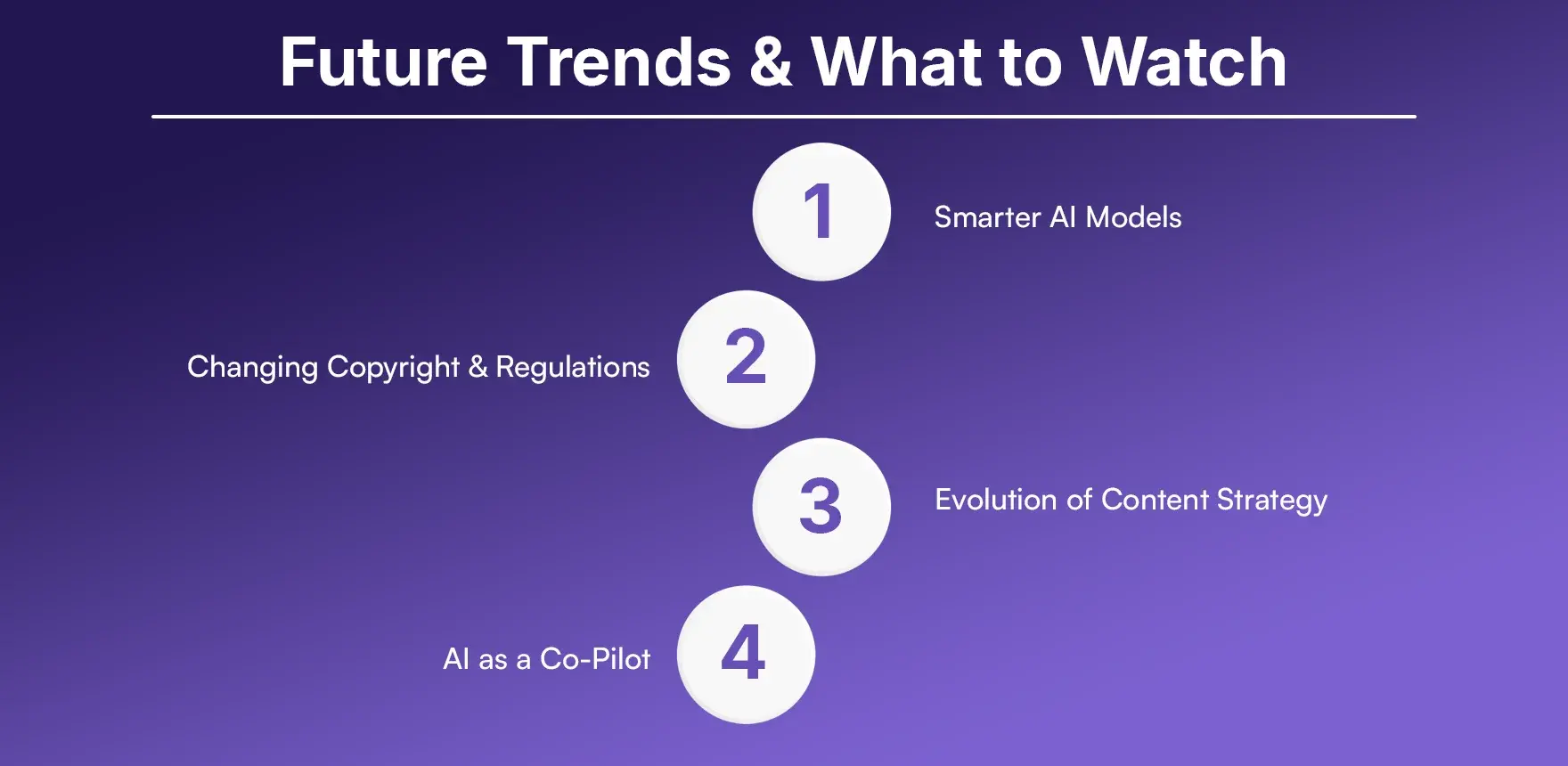
1. Smarter AI Models: As time goes on, AI tools will become more advanced, and future models will offer more real-time fact-checking, source citations, and personalized writing styles, significantly improving the quality of AI content.
2. Changing Copyright & Regulations: Over time, many governments will implement new laws, making AI content policies more stringent. In the future, it may be possible that a page's ranking factor will be determined based on ethical transparency.
3. Evolution of Content Strategy: In the future, brands' main focus will shift from quantity to quality. Their goal will be to produce fewer, deeper, and experience-driven articles, not thousands of spammy articles.
4. AI as a Co-Pilot: The next phase of writing will see AI tools used as a creative tool, where humans and machines will work together, with AI providing the structure of the content and human creativity or experience.
Conclusion
We've already learned who should use AI writing and traditional writing, and we see the distinct advantages and disadvantages of both. However, if I had to guide you from my own experience, I would advise you that you should use both AI tools and traditional writing.
You can use AI tools for ideas and formatting, but to ensure original and high-quality content, write the content yourself. This, combined with emotions, will increase your overall productivity and allow you to generate high-quality content. And if you're looking for the best writing assistant, you might prefer the AssignmentGPT AI Writing Assistant.
FAQs
1. Is AI writing better than human writing?
2. Can AI replace professional writers completely?
3. What are the main benefits of using AI writing tools?
4. What are the biggest drawbacks of AI in writing?
5. How can businesses strike a balance between AI and human writers?
Content writer at @AssignmentGPT
Ashu Singh, content writer at AssignmentGPT, crafting clear, engaging content that simplifies complex tech topics, with a focus on AI tools and digital platforms for empowered user experiences.
Master AI with
AssignmentGPT!
Get exclusive access to insider AI stories, tips and tricks. Sign up to the newsletter and be in the know!

Transform Your Studies with the Power of AssignmentGPT
Empower your academic pursuits with tools to enhance your learning speed and optimize your productivity, enabling you to excel in your studies with greater ease.
Start Your Free Trial ➤Start your success story with Assignment GPT! 🌟 Let's soar! 🚀
Step into the future of writing with our AI-powered platform. Start your free trial today and revolutionize your productivity, saving over 20 hours weekly.
Try For FREE ➤